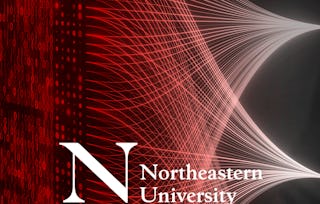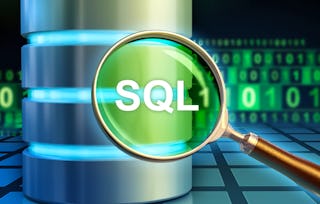In the Data-Driven Systems: DBMS, SQL & Data Modeling course, you will gain an essential foundation in database theory and skills, exploring key concepts and architecture within a data-centric system context. You will acquire valuable knowledge and skills in managing, manipulating, and analyzing large datasets, with an emphasis on both relational and NoSQL databases.
即将结束: 只需 199 美元(原价 399 美元)即可通过 Coursera Plus 学习新技能。立即节省

您将获得的技能
要了解的详细信息

添加到您的领英档案
14 项作业
了解顶级公司的员工如何掌握热门技能

该课程共有4个模块
In Module 1, you will embark on a journey through the history and evolution of database systems, gaining valuable insights into the milestones that have shaped modern data management. Through critical analysis of historical contexts and past design strategies, you will develop a nuanced understanding of how database designs have progressed and occasionally faltered. We will evaluate the impact of these developments on current database practices and learn to apply this knowledge to assess and enhance database effectiveness.
涵盖的内容
4个视频19篇阅读材料4个作业1个讨论话题
In Module 2, you will explore the intricacies of database modeling, learning to articulate and refine models using established and emerging methodologies. This module aims to equip you with a solid understanding of fundamental modeling concepts, the skills to use UML and Crow’s Foot notations effectively, and the ability to perform and critically analyze Entity Relationship Models. By exploring the principles and components of various data models, you will enhance your ability to develop robust database structures tailored to specific requirements.
涵盖的内容
2个视频15篇阅读材料6个作业
In Module 3 you will explore the crucial phases of the database development life cycle, delving deep into the theory and practice of database normalization. This section is designed to enhance your proficiency in developing streamlined and efficient database structures, aligning with industry best practices. Through a comprehensive survey and analysis, you will gain insights into how databases fit within software architectures and the importance of each development stage.
涵盖的内容
1个视频11篇阅读材料2个作业1个讨论话题
In Module 4 you will focus on advanced database techniques, with a special emphasis on MongoDB. You will learn about the critical role of normalization in optimizing database design for performance and scalability. Additionally, this part will cover advanced concepts such as document-oriented databases, indexing strategies, and performance tuning, providing you with the skills to implement and manage robust database solutions using MongoDB.
涵盖的内容
1个视频12篇阅读材料2个作业
位教师

从 Data Management 浏览更多内容
 状态:预览
状态:预览Illinois Tech
 状态:预览
状态:预览Northeastern University
人们为什么选择 Coursera 来帮助自己实现职业发展




常见问题
To access the course materials, assignments and to earn a Certificate, you will need to purchase the Certificate experience when you enroll in a course. You can try a Free Trial instead, or apply for Financial Aid. The course may offer 'Full Course, No Certificate' instead. This option lets you see all course materials, submit required assessments, and get a final grade. This also means that you will not be able to purchase a Certificate experience.
When you purchase a Certificate you get access to all course materials, including graded assignments. Upon completing the course, your electronic Certificate will be added to your Accomplishments page - from there, you can print your Certificate or add it to your LinkedIn profile.
Yes. In select learning programs, you can apply for financial aid or a scholarship if you can’t afford the enrollment fee. If fin aid or scholarship is available for your learning program selection, you’ll find a link to apply on the description page.
更多问题
提供助学金,








